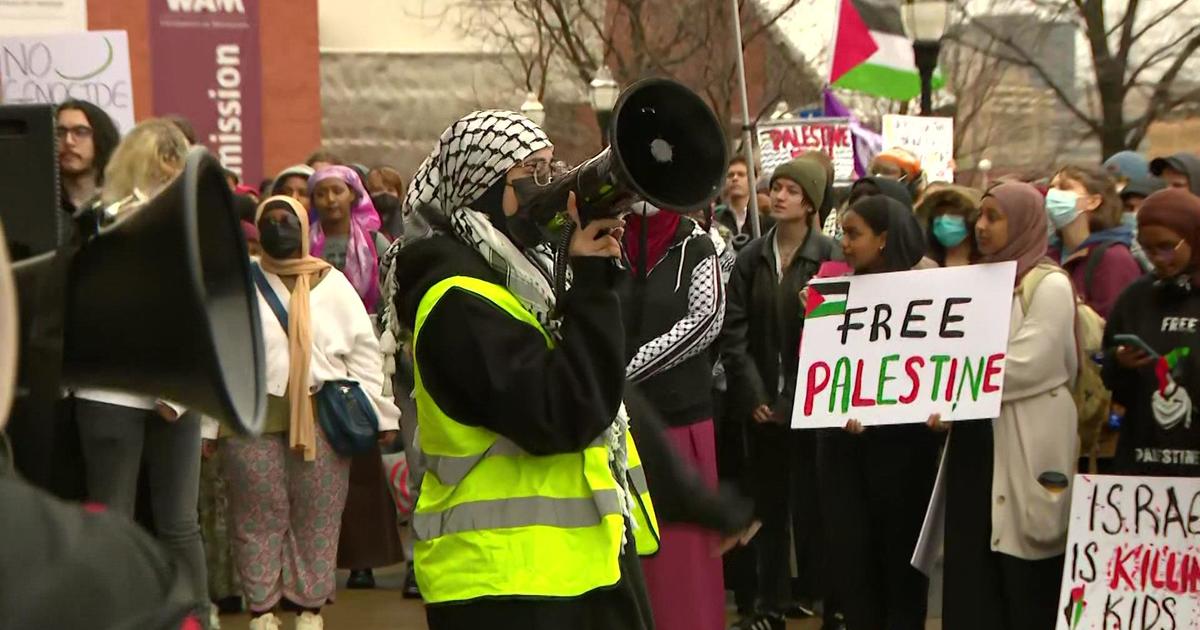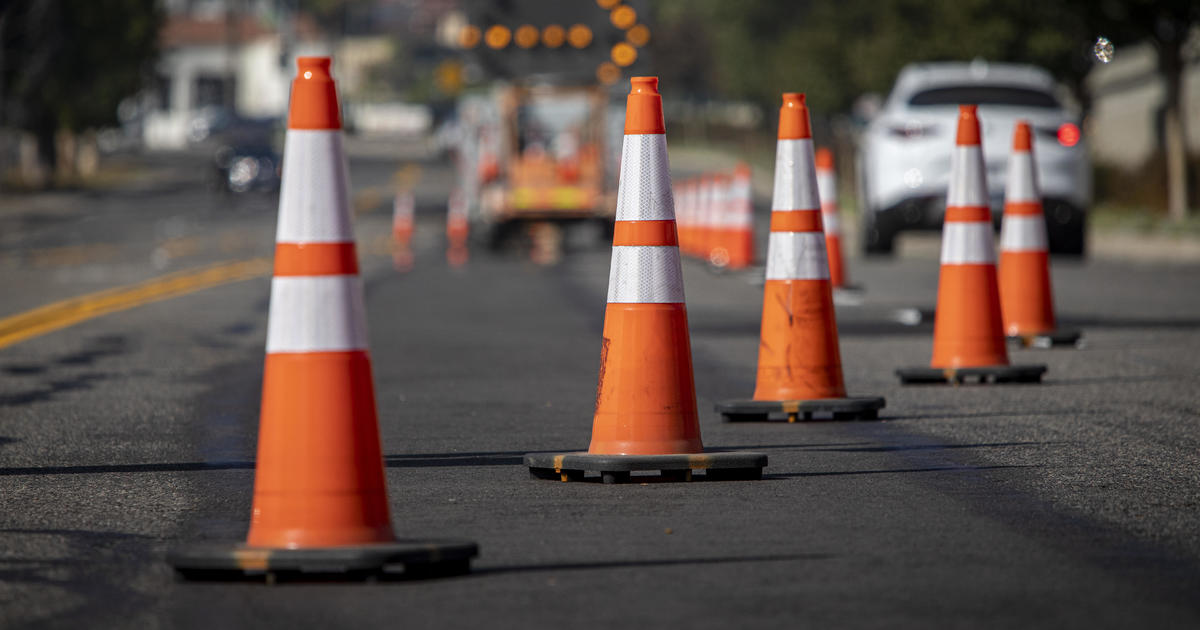Politics
Column: Trump's antics didn't stop his New York hush money trial. Here's why he'll keep them up

After a pretrial period replete with juvenile tantrums, nonstarter attempts to delay the proceedings, and savage attacks on prosecutors, the presiding judge and New Yorkers in general, Donald Trump is about to face the men and women who will decide whether he is guilty of 34 felony charges.
With the start of his historic hush money trial in Manhattan on Monday, the former president might be expected to abandon these so far unsuccessful tactics. But don’t bet on it.
The trial’s opening act will likely feature much the same brand of petulance and vituperation from the defendant, now redirected to the jury selection process.
Expect Trump to beat the same drum he has for several months, savaging anyone within legal reach — that is, not expressly off limits under the gag orders Justice Juan M. Merchan has imposed — and playing the martyr suffering for his followers at the hands of the anti-MAGA elite.
Even as he faces the tangible prospect of a conviction and prison sentence — though appeals could take several years — his strategy will continue to be more political than legal. He’s hoping to win the presidency and then figure out how to clean up the various train wrecks left in his path.
To begin with, that means Trump and his legal team can be expected to rail at Merchan’s decisions about whom to seat on the jury.
Like most jurisdictions, Manhattan follows a set of rules that impose a rigorous strategy on the litigants. Each side has 10 golden tickets known as peremptory challenges, which can be used to exclude a prospective juror for any or no reason (so long as it is not unconstitutionally based on race). In addition, each side can argue for an unlimited number of challenges “for cause.”
The latter are for jurors the litigants argue are unfit to serve for any number of reasons. They could have a close relationship with a party or lawyer in the case, personal experience with the type of crime alleged or some other conflict or bias. In general, the court must agree that they are incapable of carrying out the juror’s core responsibility of applying the law fairly to the evidence.
The prosecution and defense will have disparate strategies. The prosecution will want reasonable and persuadable people who are able to collaborate collegially and come to a consensus. Their ideal candidate may be along the lines of a well-educated professional.
Trump, meanwhile, has little prospect of acquittal, so his team will search for a juror willing to buck the other 11 no matter how strong their consensus. That means a maverick whose life choices reflect indifference or even antipathy toward the crowd.
Given a defendant of Trump’s notoriety, the jury will inevitably include people with strong views about him. The quest of the jury selection process is not for people who have no views about the former president but rather those who can set aside whatever personal views they have and render a judgment based on the evidence and the law.
That means potential jurors may present themselves and express views — including negative views about Trump — but, on questioning from the judge and prosecutor, aver that they can apply the law and reach a verdict fairly.
Even if Trump’s side argues that a juror is inclined to convict, the judge may side with prosecutors and conclude that they can be trusted to do their duty. And then Trump’s counsel will have to decide whether to use one of their precious peremptory challenges. Eventually, they will be forced to accept jurors they don’t like.
Such losing arguments will be more fuel for Trump’s eternal fire of victimhood and grievance, and we can expect him to leverage them as supposed proof of the deep state conspiracy to take him down. And if his complaints cross the lines drawn by Merchan’s gag orders, they could set up an ancillary set of bitter legal battles. Prosecutors have already moved to have Trump held in contempt for incendiary social media messages on the eve and at the start of the trial.
Trump’s political strategy has always been in tension with his legal vulnerability, leading him to vilify the judges presiding over his cases and essentially dare them to hold him in contempt. Now that a jury is sitting in judgment of his conduct, that strategy will go from dubious to asinine. Still, he hasn’t given us any reason to expect him to abandon it.
Look for the jury selection process and the trial to feature more of Trump’s tantrums in court and tirades on the courthouse steps, sorely trying the patience of all involved, not least the judge.
Harry Litman is the host of the “Talking Feds” podcast and the Talking San Diego speaker series. @harrylitman

Politics
Anti-Trump DA's no-show at debate leaves challenger facing off against empty podium

Fani Willis facing new legal issues
Fox News legal editor Kerri Kupec Urbahn on new legal concerns for Fulton County, Georgia DA Fani Willis and the latest findings from the Hunter Biden investigations
Democratic Fulton County District Attorney Fani Willis’ political opponent debated with an empty podium after Willis skipped the county’s first Democratic Party debate, local reports show.
Willis is the Georgia district attorney who brought forth the election inference case against former President Trump, charging him and 18 co-defendants with racketeering over allegations they tried to overthrow the 2020 election. Willis became embroiled in controversy when she was accused of having an “improper” relationship with the special counsel she hired, Nathan Wade.
A judge ordered Willis last month to either remove herself from the case or fire Wade, with Wade ultimately resigning.
The Fulton County Democratic Party held its first primary debate on Sunday, but Willis was a no-show, leaving her political opponent to take the stage alone, where he criticized his fellow Democrat for hiring a romantic partner for the high-level case.
ERIC TRUMP WARNS BRAGG, WILLIS ‘WANT TO TORTURE MY FATHER’ BUT NO ONE ‘IS BELIEVING IT’
Fulton County DA candidate Christian Wise Smith on an empty debate stage. (Fox 5)
“That issue is important to us in Fulton County and a lot of people across the country,” Smith said on the stage, Fox 5 reported.
”When you pay one attorney nearly $1 million to handle one case, that leaves the rest of us vulnerable. That hurts everyone in Fulton County,” he said.
FANI WILLIS SHOULD FACE GAG ORDER IN TRUMP ELECTION CASE, SAYS LEGAL ANALYST
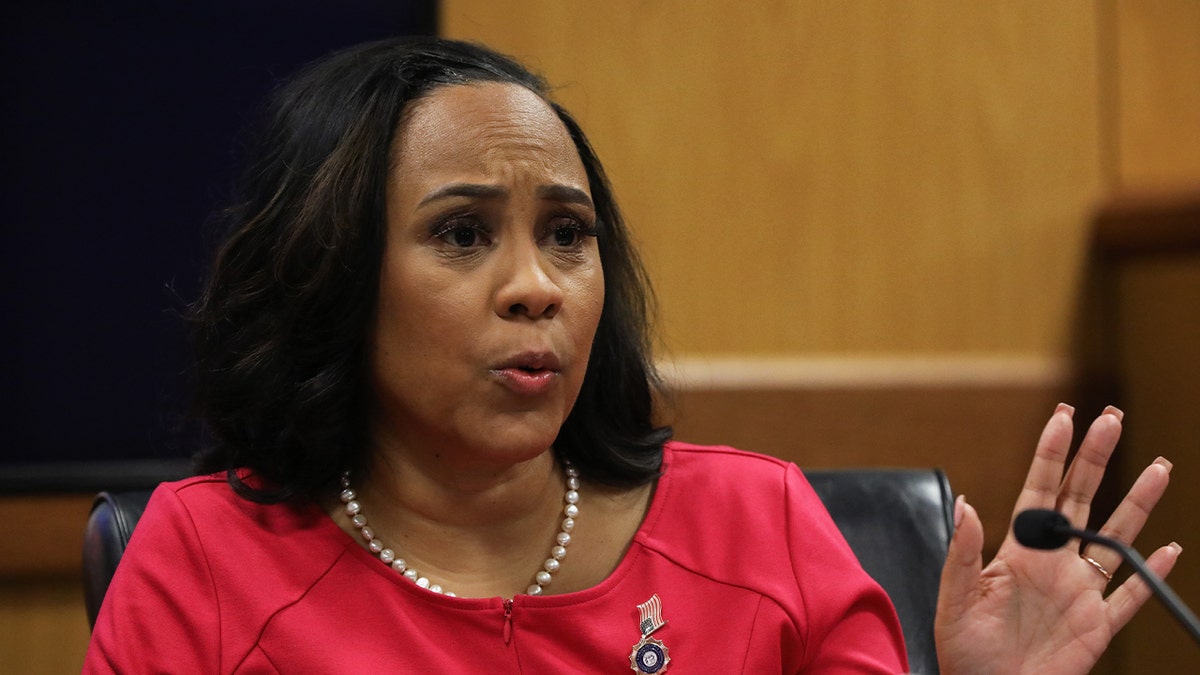
Fulton County District Attorney Fani Willis testifies during a hearing in the case of the State of Georgia v. Donald John Trump at the Fulton County Courthouse on Feb. 15, 2024 in Atlanta. (Alyssa Pointer/Getty Images)
Smith did not take issue with Willis prosecuting Trump or the case itself, instead saying Willis has “to do things differently.”
Willis did not attend the debate event, which was sponsored by the Atlanta Press Club, to co-host the second annual “Self Care Fair” with an Atlanta city councilwoman in honor of Crime Victims’ Rights Week. Willis is also focusing on the continued prosecution of Trump, Fox 5 also cited as to why she was not present for the debate.
AFTER JUDGE’S SCOLDING FOR PLAYING ‘RACE CARD,’ FANI WILLIS SAYS SHE’LL ‘TALK ABOUT IT ANYWAY’
Fox News Digital reached out to Willis’ media team for additional comment on the matter but did not immediately receive a response.
Willis and Smith will face off in the Democratic primary on May 28. Despite the controversy surrounding the Trump case, local polling shows Willis with strong leads over Smith, Fox 5 reported.
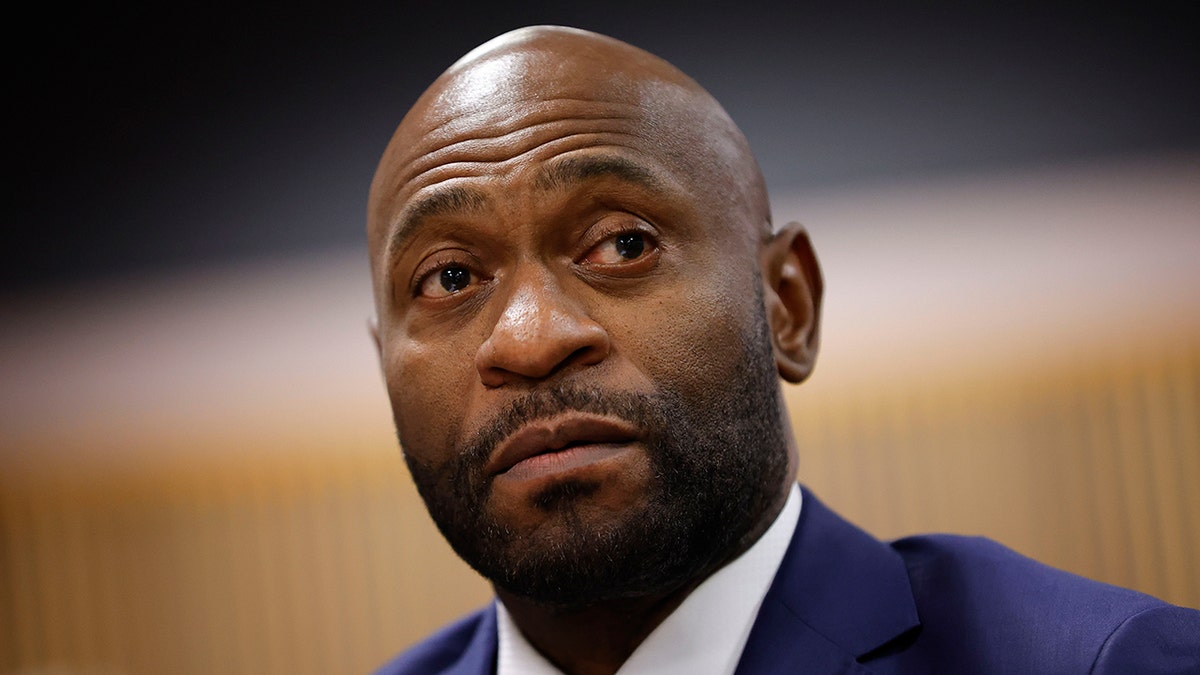
Special prosecutor Nathan Wade sits in court during a hearing in the case of the State of Georgia v. Donald John Trump at the Fulton County Courthouse on March 1, 2024 in Atlanta. (Alex Slitz-Pool/Getty Images)
The Democratic champion of the primary will compete against a Republican challenger on Nov. 5.
JUDGE IN GEORGIA SLAMS FANI WILLIS’ ‘IMPROPER’ CHURCH SPEECH, ‘PLAYING THE RACE CARD’
Willis and Wade both admitted to the affair amid testimony on the matter, but said they only made their relationship official in 2022, after charges were brought against defendants in the Trump case. Witnesses in the case, however, alleged the pair began their relationship before 2022.
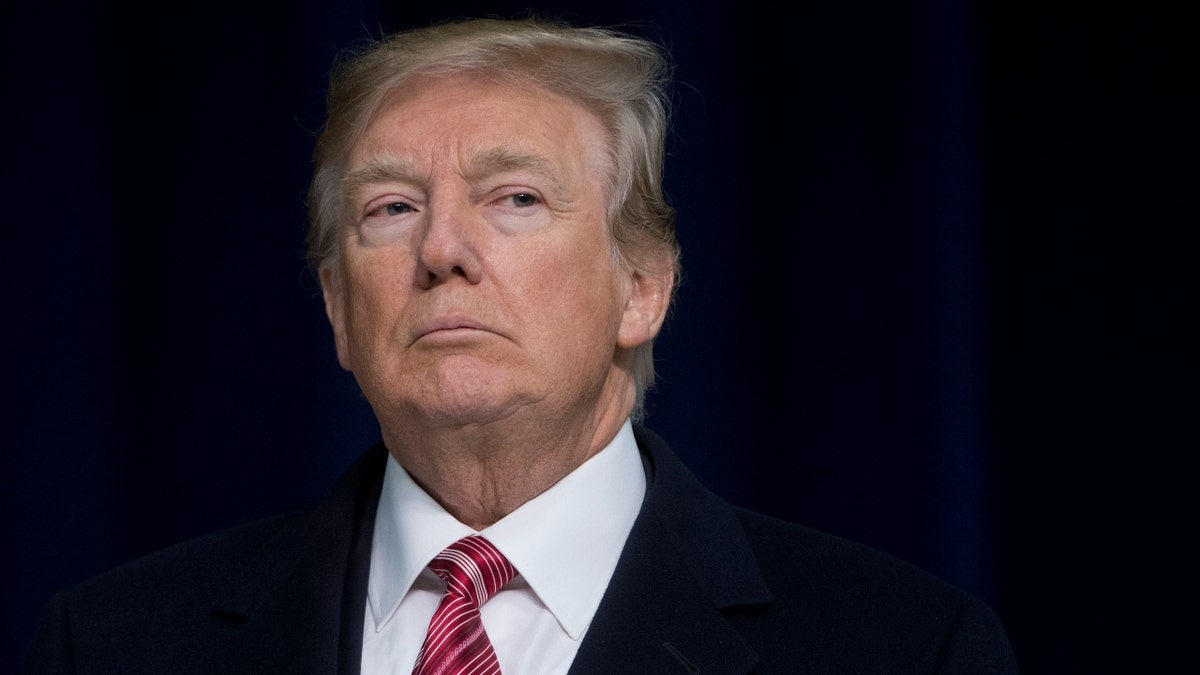
Fulton County District Attorney Fani Willis brought forth the election inference case against former President Trump. (SAUL LOEB/AFP via Getty Images)
Fulton County Judge Scott McAfee said last month that there was a “significant appearance of impropriety that infects the current structure of the prosecution team,” but did not find an “actual conflict of interest in this case through her personal relationship and recurring travels with her lead prosecutor.” McAfee ruled that either Willis step aside from the case or Wade be fired. Wade resigned last month.
JUDGE RULES FANI WILLIS MUST STEP ASIDE FROM TRUMP CASE OR FIRE SPECIAL PROSECUTOR NATHAN WADE
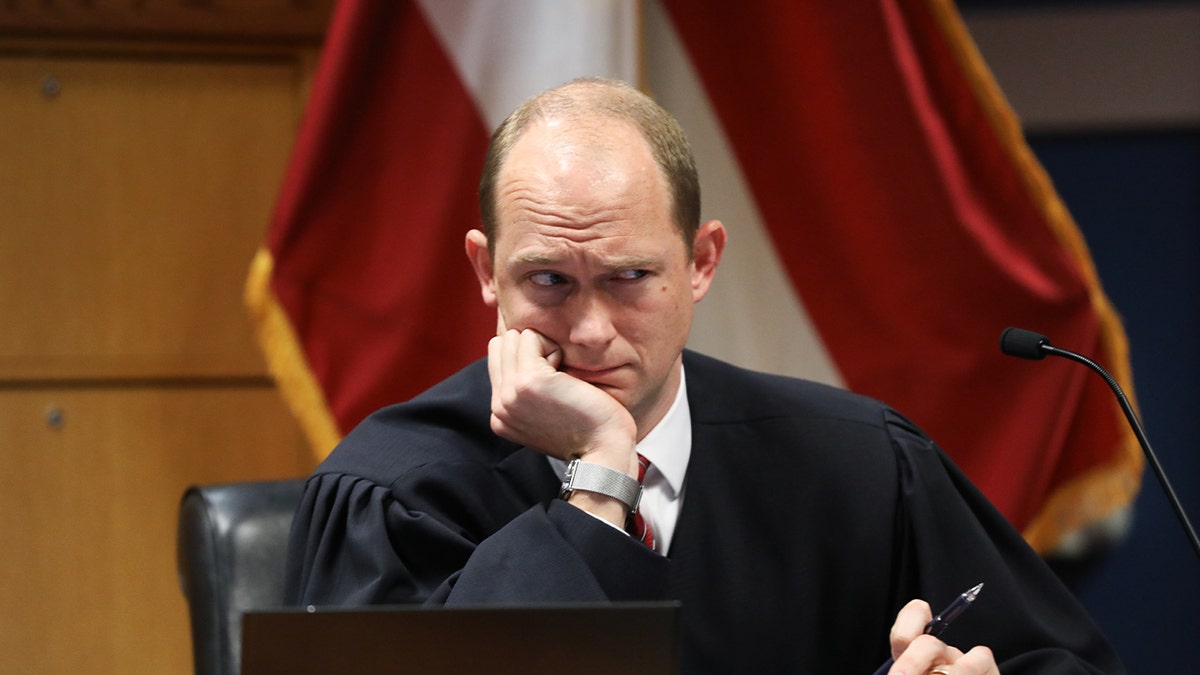
Scott McAfee, Fulton County superior court judge, at the Fulton County Courthouse in Atlanta on Thursday, Feb. 15, 2024. (Photographer: Alyssa Pointer/Reuters/Bloomberg via Getty Images)
Willis has brushed off criticisms of her affair with Wade, touting herself late last month as the only district attorney with the “courage” to prosecute Trump.
TRUMP BLASTS FULTON COUNTY PROSECUTOR FANI WILLIS AFTER ROMANTIC PARTNER ALLEGATIONS: ‘TOTALLY COMPROMISED’
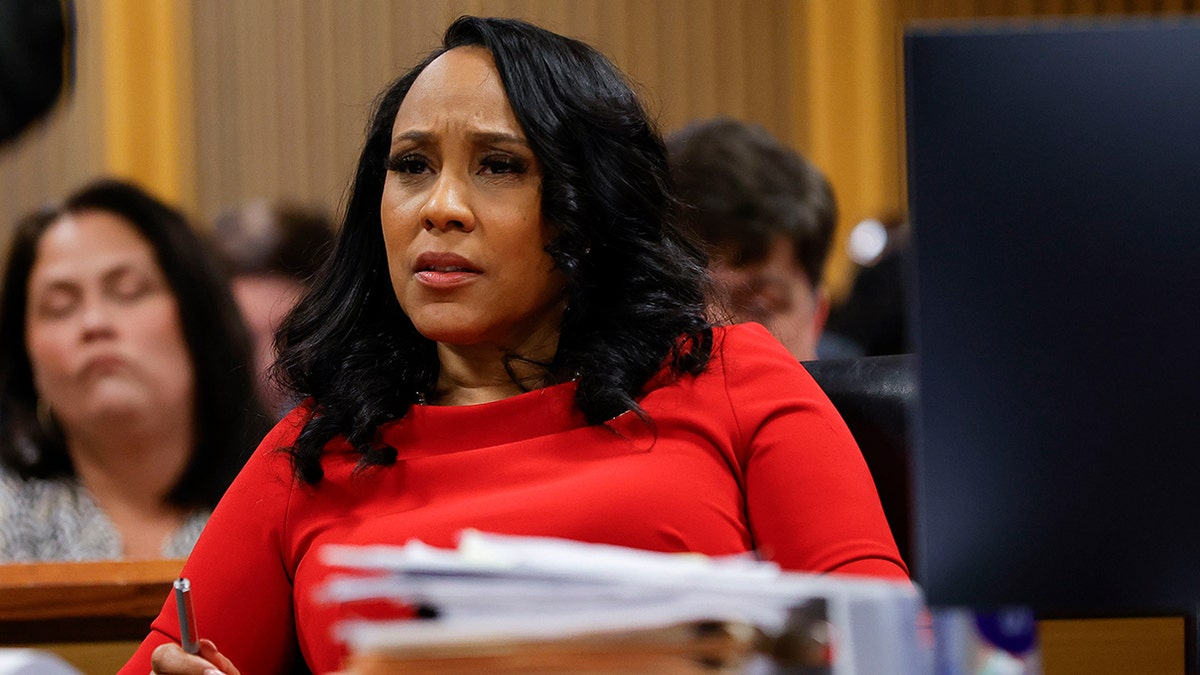
Fulton County District Attorney Fani Willis looks on during a hearing in the case of the State of Georgia v. Donald John Trump at the Fulton County Courthouse on March 1, 2024, in Atlanta. (Alex Slitz-Pool/Getty Images)
“There’s one district attorney in the state – and really around the country – that has had the courage to do this, and she continues to do it,” Willis told FOX 5 Atlanta last month. “The case landed in Fulton County, not by anything that I did, but by the actions of others, and when a case lands in my jurisdiction, I’m going to prosecute it, and that’s the end of that.”
Trump, meanwhile, has slammed the case as a “witch hunt” that is led by a “totally compromised” district attorney.
Politics
Many O.C. residents deny Trump election results, potentially swaying key races, poll finds

Alex Lopez doesn’t contest that Joe Biden was elected president in 2020.
His concern lies with how those results came to be.
“By the numbers? He absolutely won it. Ethically? Probably not,” said the 38-year-old Anaheim resident, who works as a logistics coordinator.
Questions about the integrity of the election process have been stoked nationally for years, in large part because of former President Trump’s claims that victory was stolen from him.
The same goes for Orange County, where 26% of adults surveyed in a UC Irvine poll released this month said they did not believe Biden legitimately won the presidency in 2020, with another 17% unsure about the question.
In a purple county with several key races that could help determine the balance of power in Congress, these doubts could cause voters to stay home in November — particularly conservative voters.
A majority of the O.C. Republicans surveyed for the poll — 55% — thought Biden had not won fairly, while most Democrats — 88% — believed the election results.
A majority of people surveyed who aren’t members of either party said Biden won legitimately. However, 23% said he didn’t, and the same percentage didn’t know.
“Distrust in the election system may very well convince some people not to participate, and what we’re seeing is that people who distrust it more tend to skew to the right, and so that would hurt Republicans,” said Jon Gould, dean of the UCI School of Social Ecology, who spearheaded the poll.
The issue has played out locally in Huntington Beach, a longtime GOP stronghold that in recent years — along with the rest of the county — has grown more politically and demographically diverse. This has led to friction among residents and politicians with opposing political views.
In March, voters approved a measure allowing the city to require that voters show government-issued photo identification, beginning in 2026.
Huntington Beach Councilman Tony Strickland and Mayor Gracey Van Der Mark wrote in support of the ballot measure that voters “deserve the right to know that our elections are secure.”
“It is crucial for our democracy that voters have faith in our election results. That trust in the outcome of elections comes into question when we can’t always be certain who is voting,” they wrote.
California law requires residents to verify their identities when they register to vote and imposes criminal penalties for fraudulent registration. The state does not ask for photo identification at the polls, but voters are required to provide their names and addresses.
This month, California sued Huntington Beach over its new law. Atty. Gen. Rob Bonta said during a news conference that the photo identification requirement “is not only misguided — it is blatantly and flatly illegal.”
Election skepticism in O.C. may be lower than in some other parts of the country. In a national poll conducted by the Washington Post and the University of Maryland last December, 36% of respondents said Biden’s victory was not legitimate.
But in the highly competitive Orange County congressional races, particularly the 47th and 45th districts, where a few votes could sway the outcome, the repercussions could be far-reaching.
In the 45th District, Democrat Derek Tran is challenging incumbent Republican Rep. Michelle Steel. In the 47th District, which runs largely along the coast, Democrat state Sen. Dave Min and Republican Scott Baugh are facing off to replace Democratic Rep. Katie Porter.
As for the presidential rematch between Biden and Trump, there is little suspense in California because of its deep blue population in urban areas.
Still, Trump asserted in a speech at the GOP California Convention in Anaheim last year that “we would win California in a general election if they didn’t have a rigged voting system.” He alleged that people are getting five or six ballots mailed to them.
“Nobody knows where they’re going, who they’re going to, who signs them, who delivers them and who the hell counts them? Nobody knows,” he said.
The widespread use of vote-by-mail ballots, which began during the pandemic and has remained popular, has altered the pattern of vote counting as results trickle in, fueling beliefs that something nefarious is afoot.
“Trump was winning on election night, and then as more and more votes were counted, he began to lose, and that looks to some people like someone’s been tweaking the election results, as opposed to people for the first time being exposed to vote by mail,” Gould, of UCI, said.
Orange County Registrar of Voters Bob Page started conducting open tours of the ballot counting operation in Santa Ana during the 2022 midterms in an effort to show people the process and alleviate concerns.
But election skepticism and allegations of a “rigged” voting system have persisted.
The economy, abortion, foreign policy and immigration remain top issues for Orange County voters this cycle, according to the UC Irvine poll. The economy is among the top issues for both Democrat and Republican voters.
Democrats rank abortion as the third most important issue, behind checking a Trump presidency from “going too far” and the economy. Republicans rank the economy and situation at the border as their first and second most important issues.
Lopez, who is a nonaffiliated voter, said he worries about issues like ballot harvesting — particularly affecting people who might be susceptible to outside pressure — that he fears could skew election results.
He also has concerns about the “motor voter” system, in which Californians applying for or updating a driver’s license are automatically registered to vote, unless they opt out. In 2018 — the year the system rolled out in California — roughly 1,500 people, including noncitizens, were wrongly registered to vote.
“I would love to hear the government and states come out and say, ‘Hey, you know what, these are the concerns from a lot of people, and we’re going to put some stopgaps in there,’” Lopez said.
Lopez, who ranks the economy as a top issue, still plans to vote. He is still researching candidates in all the races but said he’s leaning toward Trump for president.
Others disillusioned with the voting process might choose to sit this one out.
“By selling doubts in the election, there is an interesting question as to whether Republicans and Trump in particular are sowing the seeds for their own defeat,” Gould said.
Politics
Where Third-Party and Independent Candidates Are On The Ballot
Robert F. Kennedy Jr.
Green Party
Cornel West
For presidential candidates who are not the Republican or Democratic Party nominee, getting on the ballot for the general election is a state-by-state, make-or-break scramble. Each state has unique (and sometimes confusing) election laws, and the process for qualifying as a minor party — like the Green Party — is typically different from the process of getting on the ballot as an independent candidate, like the theologian Cornel West or the environmental lawyer Robert F. Kennedy Jr., neither of whom have a national party affiliation.
Though it depends on the state, the Green Party, like other minor national parties, typically secures ballot access by virtue of its performance in a preceding election. For example, the Green Party recently lost its ballot line in New York State because its candidate did not meet a strict new voter threshold — 2 percent of the total votes cast — in the 2020 presidential election. And so to get on the New York ballot this year, the Green Party must gather 45,000 signatures in a six-week window that closes at the end of May.
This is the same process that Mr. Kennedy and Mr. West must go through to gain ballot access in New York and in dozens of other states. Some states have rules against people coming in from out of state to help a campaign procure signatures; others have rules that restrict a campaign’s ability to hire paid canvassers instead of relying solely on volunteers. Some states allow months for independent candidates to gather signatures, while others have short windows. Some states require a vice presidential nominee on the petition. The work of actually gathering thousands of signatures, and ensuring that all these rules are met, is grueling and often costly.
Here’s where Mr. Kennedy, Mr. West and the Green Party — which is expected to select its nominee at its convention in July — stand.
-

 Kentucky1 week ago
Kentucky1 week agoKentucky first lady visits Fort Knox schools in honor of Month of the Military Child
-

 News1 week ago
News1 week agoIs this fictitious civil war closer to reality than we think? : Consider This from NPR
-

 World1 week ago
World1 week agoShipping firms plead for UN help amid escalating Middle East conflict
-

 Politics1 week ago
Politics1 week agoICE chief says this foreign adversary isn’t taking back its illegal immigrants
-

 Politics1 week ago
Politics1 week ago'Nothing more backwards' than US funding Ukraine border security but not our own, conservatives say
-

 News1 week ago
News1 week agoThe San Francisco Zoo will receive a pair of pandas from China
-

 World1 week ago
World1 week agoTwo Mexican mayoral contenders found dead on same day
-

 Politics1 week ago
Politics1 week agoRepublican aims to break decades long Senate election losing streak in this blue state

